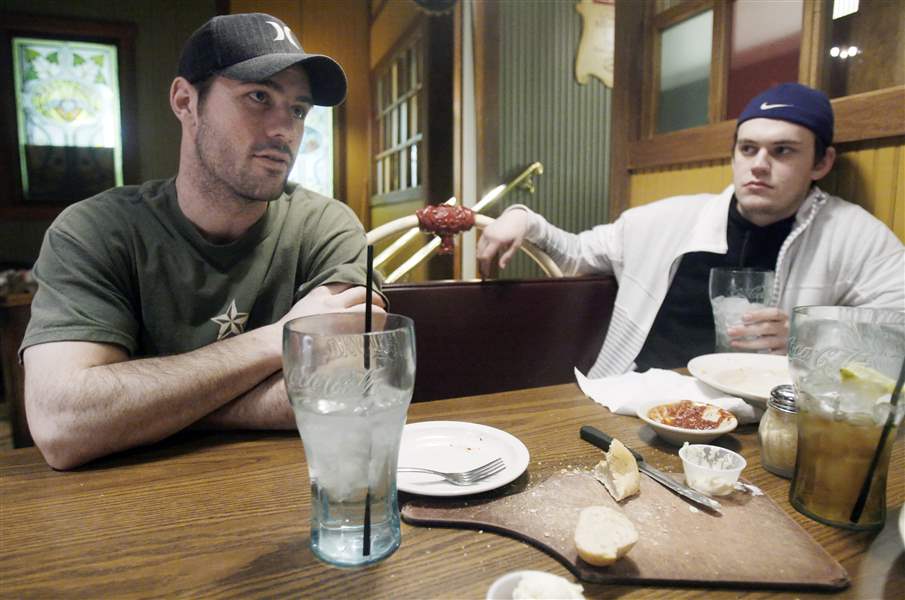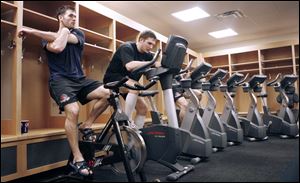
Life in the Fish Tank: Hockey players settle into Toledo routine
2/14/2010
Chris Robertson, left, and teammate Alec Richards take a break for a meal at the Spaghetti Warehouse downtown. The Walleye players spend a lot of time together socially and on the ice.
Jeremy Wadsworth / The Blade
Buy This Image
When a wayward hockey stick smashed into his face near his eye, Chris Robertson experienced plenty of pain but he also felt jinxed in an otherwise dream job.
Robertson, a 26-year-old center for the Toledo Walleye, said such injuries are the only major drawbacks to being a professional hockey player.
"There are no downs to it at all," Robertson said. "You're getting paid to play hockey. It's something you love. There aren't many times when you get mad. You get down if you lose. But you have to look at everyone else and they're working 9 to 5 or 12 to 12. We work for about three hours a day doing something we love and we're getting paid for it."
Robertson said he had remained relatively injury free during a seven-year playing career that began when he was 17. But Robertson wasn't count-ing what he casually termed the "occasional torn ACL" or "odd shoulder separation."
"I got hit in the face with one of my teammate's sticks," he said of the injury that occurred during a preseason scrimmage in October.
"It was pretty bad," Robertson said. "It all went numb. It broke the orbital bone in two spots. I had to have surgery and sat out a few weeks."
After he was placed on the injured reserve list for Toledo's first 11 games of the season, Robertson made his debut with the Walleye on Nov. 13. The crafty scorer ranks fourth on the team in points with 11 goals and 21 assists.

Chris Robertson, foreground, works out on a bike after practice. The team also goes to a local gym.
"I had never broken a bone in my body until 2009," Robertson said. "Then I broke my leg, my wrist, and my face all in one year."
Growing up in Owen Sound, Ont., Robertson had the same dream as most Canadian boys. He has been lacing up skates since he was 4. "That's what we do up there," he said.
He wanted to play in the National Hockey League. He still does. Robertson is playing in his first season in the ECHL, hockey's top Double-A league.
The center gets paid to light the goal lamp in front of exuberant crowds that average about 6,000 at the new downtown Lucas County Arena in a blue-collar, hockey-hungry city.

"Basically, it's a pretty easy life," Robertson confessed. "You have a lot of time off during the week. You work at the morning skate from 10:30 to 11:30. You get a little bit of a workout in and then you have the rest of the day off.
"You can't go wrong when you have these fans every night to back you. It's great coming to a hockey town where it's well liked. Plus it's a state-of-the art facility."
Of the 20 players on the team's active roster, 13 are Canadian. Seven of the Walleye players are American-born.
Ten of the team members attended college before embarking on their pro careers. The other 10 started out playing junior hockey, minor-development leagues for teenagers.
The youngest player on the roster is Canadian Maxime Tanguay. The 20-year-old is the brother of NHL veteran Alex Tanguay of the Montreal Canadiens.
At 29, Scooter Smith is the team's most senior member. Smith is one of only two players on the roster who also played for Toledo's former ECHL team, the Storm.
Smith, who attended Colgate University, had some of his most productive years playing at the now demolished Sports Arena. But Smith said playing at the new Lucas County Arena versus the old barn in East Toledo is like "night and day."
Walleye teammate Adam Keefe also has played in Toledo.
"This new arena is what the city needed and what the fans deserved," Smith said.
"Obviously, you can see it because they're getting a lot of people out. It's a lot more fun to play in. It's a lot easier to come to the rink every night when you have facilities like this."
Enduring bone-crunching checks and tooth-jarring sticks to the face are part of the job. The average salary in the ECHL can run anywhere between $360 and $900 a week. That's $9,000 to $22,500 in a 25-week season.
Nick Vitucci, Walleye coach and director of operations, said he thoroughly enjoyed a 14-year hall of fame career in the ECHL that included three seasons in Toledo. The former goaltender said the organization covers the players' rent and utilities.
"They are in charge of food and their phone bill," Vitucci said. "It's not a bad gig for a kid coming out of junior hockey or college to be making $500 a week and living rent free to play pro hockey. You're in the limelight. Your picture is in the paper. And you're in a great city that loves hockey."
The organization also pays for insurance related to all injuries and rehabilitation. The players are covered through ProMedica Health System.
Robertson is among hundreds of 20-somethings toiling to prove that they're ready for the big bucks that accompany an NHL contract.
"Everyone is underpaid, right?" he said with a chuckle. "But then again you have to [realize] that you're playing hockey. There are so many guys out there that want to play. You have to go out there and earn your paycheck. It's a job. You have to work at it and get better. There are hundreds of guys that can take your spot."
Robertson is battling a nagging back injury, which requires daily treatments from trainer Brad Fredrick.
All of the Walleye players live in the same apartment complex in South Toledo. Most of them live alone in single-bedroom apartments.
"We'll go out to lunch together," Robertson said. "Other guys play video games. You get into a routine. It's usually pretty mellow during the day. Then there is usually a gathering at night. Sometimes we'll play cards or darts. Some guys will go for a few beers somewhere and play pool."
Robertson often makes the short drive with rookie goalie Alec Richards from the Lucas County Arena - where the team also practices - to the Spaghetti Warehouse in downtown Toledo's Warehouse District.
"People get excited when they find out Walleye players are around," Richards said. "They try to do something nice for us. I hang out at home a lot. But I'm not much of a cook so I eat out all the time. I'll always try to find new places around town.
"I'm a big fan of The Docks. I go there when my family is in town."
Robertson said the players will shoot hoops at a local gym. When the weather warms up, they plan to play plenty of golf.
For dinner and nightlife, he said, the players "scatter around."
"I favor the Olive Garden. On game days, about seven or eight guys go there," Robertson said. "We go to Spaghetti Warehouse after games. Sometimes we'll go to [Hat Trick Bar and Grill] or somewhere downtown for a couple beers."
"Robo," as his teammates call him, said he dreads the travel for road games. The team's bus sleeps 22 but doesn't offer much seating.
"Our bus is tough," he said. "It has a lot of bunks to lay down in. But there is only one sitting area that can fit six comfortably."
The team recently bused to Georgia and North Carolina for road games.
"You get the cards out and play poker," he said. "After the games you can have a few beers on the bus. That's what I like the most."
Robertson's hockey road trip began with a three-year junior career in the Ontario Hockey League when the teen played for the Sudbury Wolves. He has worn jersey No. 72 ever since.
Robertson made his pro debut with the San Angelo Saints of the Central Hockey League in 2004. Then he played three seasons for the CHL's New Mexico Scorpions.
Robertson had 119 career CHL goals in 304 games, including a career-high 34 goals last season before coming to Toledo.
"I'm hoping to get noticed," he said.
Robertson scored Toledo's only goal in a 5-1 loss to Charlotte on Feb. 7.
The minimum salary in the higher-level American Hockey League is nearly $40,000 over 25 weeks or about $1,700 per week.
Robertson has an ECHL contract with Toledo but can sign as a free agent with any AHL team.
If a player advances to the NHL, the minimum salary is $500,000.
"So sure the motivation is financial," Vitucci said. "You want to move up because you're going to make more money. But the more important aspect is that you're one step closer to your dream of playing in the National Hockey League."
Since the ECHL's inception in 1988-89, 425 players have worked their way up from the minor hockey league to the NHL.
At the ECHL level, most players work in the off-season to supplement their income. Vitucci said he worked for his dad's plumbing business. Robertson said he has a full-time job as a landscaper.
"I run excavators. I do everything," he said.
He said players with more lucrative AHL contracts don't work in the summer.
"I like my toys. That's why I have to work full time," said Robertson, who owns a motorcycle.
Vitucci said things were "a little wilder" on and off the ice when he played in the 1990s.
"We want these guys to go out and enjoy the experience of being a professional hockey player," he said. "But I think these players are in a fishbowl. There's more media and camera phones. They have to watch themselves. We got away with a lot more."
Robertson said this Walleye team is "a pretty good group of guys that don't stand out in a bad way."
"Most of the guys have accents. We have a lot of French-Canadian guys, so you get noticed right away," Robertson said.
Vitucci cited camaraderie as the best aspect of the job.
"For seven or eight months you're best friends with your teammates," Vitucci said.
"The one thing these guys don't know right now is that this is the best time of their lives. They may get frustrated with their play or coaches.
"But once you venture out into the working world afterwards, you realize you had it really good as a pro hockey player."
Contact Mark Monroe at:
mmonroe@theblade.com
or 419-724-6354.